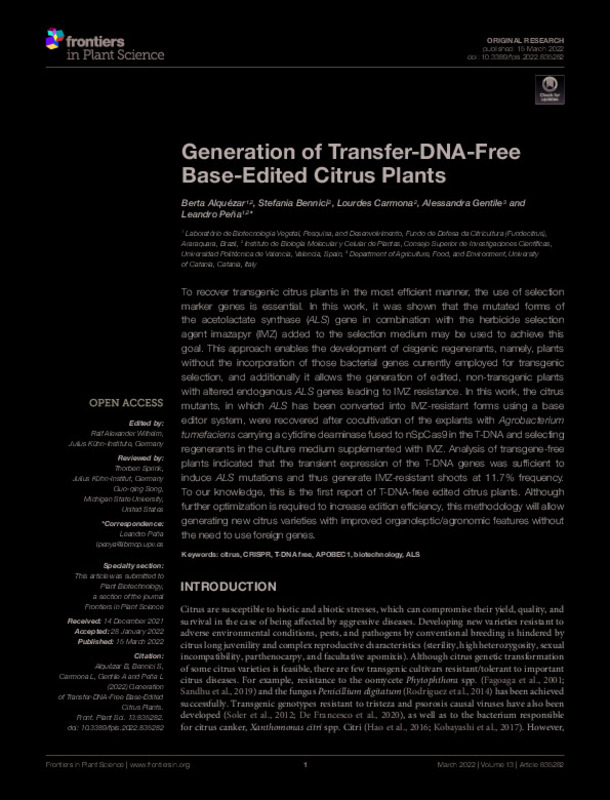JavaScript is disabled for your browser. Some features of this site may not work without it.
Buscar en RiuNet
Listar
Mi cuenta
Estadísticas
Ayuda RiuNet
Admin. UPV
Generation of Transfer-DNA-Free Base-Edited Citrus Plants
Mostrar el registro sencillo del ítem
Ficheros en el ítem
| dc.contributor.author | Alquézar-García, Berta
|
es_ES |
| dc.contributor.author | Bennici, Stefania
|
es_ES |
| dc.contributor.author | Carmona, Lourdes
|
es_ES |
| dc.contributor.author | Gentile, Alessandra
|
es_ES |
| dc.contributor.author | Peña, Leandro
|
es_ES |
| dc.date.accessioned | 2023-05-03T18:02:04Z | |
| dc.date.available | 2023-05-03T18:02:04Z | |
| dc.date.issued | 2022-03-15 | es_ES |
| dc.identifier.uri | http://hdl.handle.net/10251/193097 | |
| dc.description.abstract | [EN] To recover transgenic citrus plants in the most efficient manner, the use of selection marker genes is essential. In this work, it was shown that the mutated forms of the acetolactate synthase (ALS) gene in combination with the herbicide selection agent imazapyr (IMZ) added to the selection medium may be used to achieve this goal. This approach enables the development of cisgenic regenerants, namely, plants without the incorporation of those bacterial genes currently employed for transgenic selection, and additionally it allows the generation of edited, non-transgenic plants with altered endogenous ALS genes leading to IMZ resistance. In this work, the citrus mutants, in which ALS has been converted into IMZ-resistant forms using a base editor system, were recovered after cocultivation of the explants with Agrobacterium tumefaciens carrying a cytidine deaminase fused to nSpCas9 in the T-DNA and selecting regenerants in the culture medium supplemented with IMZ. Analysis of transgene-free plants indicated that the transient expression of the T-DNA genes was sufficient to induce ALS mutations and thus generate IMZ-resistant shoots at 11.7% frequency. To our knowledge, this is the first report of T-DNA-free edited citrus plants. Although further optimization is required to increase edition efficiency, this methodology will allow generating new citrus varieties with improved organoleptic/agronomic features without the need to use foreign genes. | es_ES |
| dc.description.sponsorship | Funding This work was funded by the EU H2020 Innovation Action Program (grant #817526) and by the Fundo de Defensa da Citricultura (Fundecitrus). | es_ES |
| dc.language | Inglés | es_ES |
| dc.publisher | Frontiers Media SA | es_ES |
| dc.relation.ispartof | Frontiers in Plant Science | es_ES |
| dc.rights | Reconocimiento (by) | es_ES |
| dc.subject | Citrus | es_ES |
| dc.subject | CRISPR | es_ES |
| dc.subject | T-DNA free | es_ES |
| dc.subject | APOBEC1 | es_ES |
| dc.subject | Biotechnology | es_ES |
| dc.subject | ALS | es_ES |
| dc.subject.classification | BIOQUIMICA Y BIOLOGIA MOLECULAR | es_ES |
| dc.title | Generation of Transfer-DNA-Free Base-Edited Citrus Plants | es_ES |
| dc.type | Artículo | es_ES |
| dc.identifier.doi | 10.3389/fpls.2022.835282 | es_ES |
| dc.relation.projectID | info:eu-repo/grantAgreement/EC/H2020/817526/EU | es_ES |
| dc.rights.accessRights | Abierto | es_ES |
| dc.contributor.affiliation | Universitat Politècnica de València. Instituto Universitario Mixto de Biología Molecular y Celular de Plantas - Institut Universitari Mixt de Biologia Molecular i Cel·lular de Plantes | es_ES |
| dc.description.bibliographicCitation | Alquézar-García, B.; Bennici, S.; Carmona, L.; Gentile, A.; Peña, L. (2022). Generation of Transfer-DNA-Free Base-Edited Citrus Plants. Frontiers in Plant Science. 13:1-12. https://doi.org/10.3389/fpls.2022.835282 | es_ES |
| dc.description.accrualMethod | S | es_ES |
| dc.relation.publisherversion | https://doi.org/10.3389/fpls.2022.835282 | es_ES |
| dc.description.upvformatpinicio | 1 | es_ES |
| dc.description.upvformatpfin | 12 | es_ES |
| dc.type.version | info:eu-repo/semantics/publishedVersion | es_ES |
| dc.description.volume | 13 | es_ES |
| dc.identifier.eissn | 1664-462X | es_ES |
| dc.identifier.pmid | 35371165 | es_ES |
| dc.identifier.pmcid | PMC8965368 | es_ES |
| dc.relation.pasarela | S\486979 | es_ES |
| dc.contributor.funder | European Commission | es_ES |
| dc.contributor.funder | Fundo de Defesa da Citricultura | es_ES |








